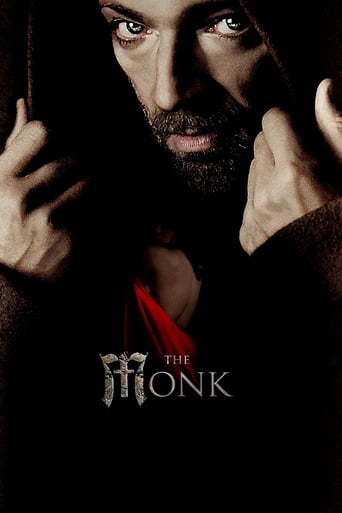SnoopyStyle
In December 1595, a baby is left at the Capuchin monastery just outside of Madrid. The monks debated and decided to raise the boy in the monastery. He would become their best orator Ambrosio (Vincent Cassel). The church is packed as his brand of strict faith inspires the congregation. Only his actions may lead him down a thorny path.Vincent Cassel has a natural intensity. This could have been a very powerful and profound movie. The story is there to put on film. But this movie has little movement. Most of the time, the characters do not move at all. It is all talk, and some of it is confoundingly slow. Other than two or three exchanges, most of the dialog could have been slash in half. The story is there. If starving a pregnant nun to death in a dungeon cell isn't compelling, then I don't know what is. The problem is everything in between. And the twist is as telegraphed as they come. This could have been a great character study as this man get more outrageous as the movie goes along. Instead, Cassel isn't allow to physically act. There is a good story but this isn't a good film. It's a promise unfulfilled.
Bene Cumb
Historical and monastery- or palace-related films are usually catchy and intense as both external and internal reclusion provide sufficient basis for these - particularly together with religious mystique. Le moine is a good example here, but not among the finest: its run is sometimes protracted, many supporting actors are unvaried (female ones, above all) and the ending does not summarize all "loose ends" recognised during the film. As of today, the issues approached do not awake the same feelings as centuries ago when the novel The Monk: A Romance was written by Matthew Gregory Lewis (1796) - at least in agnostics like me.The gem of the film is undoubtedly the star Vincent Cassel as Capucino Ambrosio (= the Monk); he outperforms his counterparts and there are scenes where his presence could have been more visible (well, usually I am not so much into so-called solo films).Thus, as for tenseness and uniformity of characters, Le moine leaves to be desired; e.g. The Name of the Rose is better.
gradyharp
Matthew G. Lewis wrote this cult classic THE MONK in 1796, and while it was a scandalous work at the time it has survived as a window into the depravity of certain orders of the church. It is particularly timely as a film now, released amidst the scandals of the Catholic Church. Dominick Moll transforms this story in to a film so reminiscent of 16th century Spain in deco and costumes (Maria Clara Notari and Bina Daigeler), music (Alberto Iglesias), and atmospheric cinematography (Patrick Blossier) that the few lapses the story takes form the novel simply do not detract from the visual beauty of this film.The film opens with an old beggar dropping off an infant on the church steps of a Capuchin monastery in 16th century Spain. The friars raise the child, convinced he is a miracle from the Virgin Mary and at age 18 Ambrosio (Vincent Cassell) takes the vows and becomes a sanctified Capucin monk, but not just a monk but also one blessed with righteousness and distance from temptation. Scores come to the monastery to simply see him and have him hear their confession. His beneficence to a young nun (Roxane Duran) who has become pregnant is cancelled by the abbess of the nunnery (Geraldine Chaplin) and evil begins to shroud the film. A young monk Valerio (Déborah François) is brought to the monastery masked to apparently cover the brutal burn wounds on his face, but in actuality Valerio has healing powers, is able to heal Ambrosio's frequent severe headaches, and finally reveals to Ambrosio that there is a women beneath that mask. From this point the near holy monk Ambrosio falls from grace and descends into seduction, depravity, satanic secrets and murder.Yes, there are lapses in the story that beg explanation but the atmosphere created by the cinematic team and the performances by Vincent Cassell and the rest of the cast more than make this a fine cinematic achievement. Grady Harp
Armand
Beautiful images. Good cast. Generous idea and inspiring option for a successful adaptation. And final taste of sand. Result - a movie who may be more interesting, a seductive dusty story and silhouette of Vincent Cassel,drop-presence of Geraldine Chaplin and a tale told in haste and careless. Few crumbs from Spanish picture and fruits of sufficiency and self-deception. Sin as shadow of snake in the heart of every Faust. And music as oil for dark bread. A Catholic movie about price of Icarus flight. The rush is principal error. And the desire to create a powerful moral lesson. So, at final, the basic virtue is inspiring play of Cassell. Is it enough ? Maybe.



